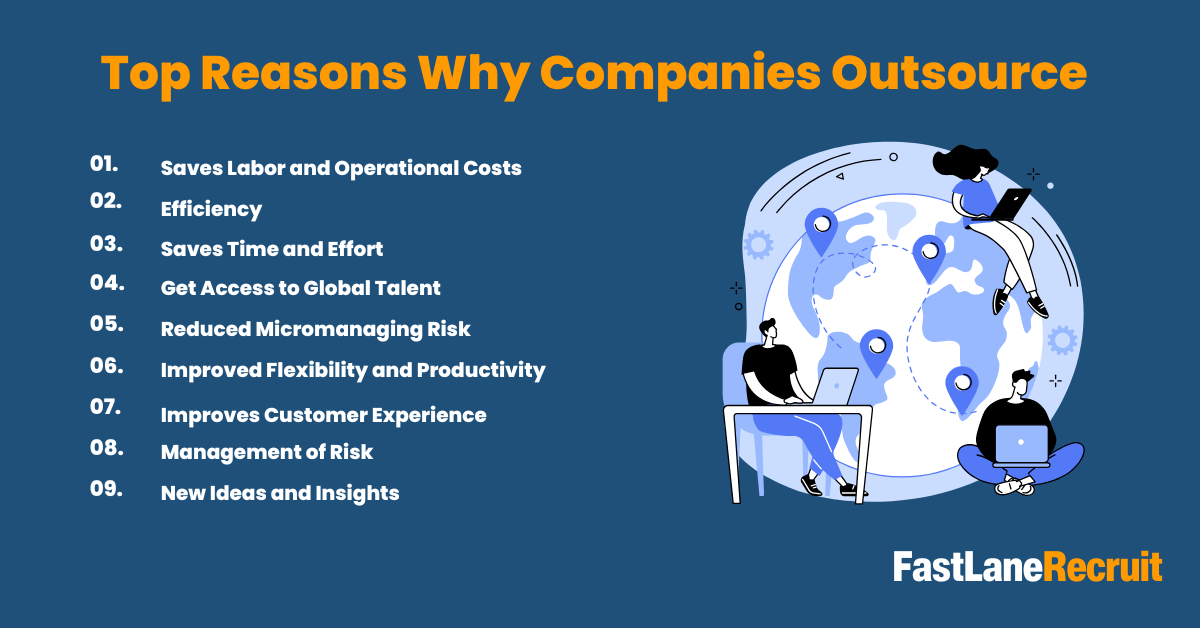As business landscapes evolve and competition intensifies, companies are increasingly driven to seek leaner, more agile operational models. One key strategy that has gained traction globally is outsourcing, delegating non-core tasks to external specialists to streamline operations, reduce overhead, and increase agility.
From startups to multinational corporations, outsourcing has become a cornerstone of modern business operations, allowing companies to concentrate on growth, innovation, and customer engagement without the burden of handling every process internally.
Content Outline
Key Summary
Outsourcing is a strategic business solution to boost productivity, reduce costs, and improve flexibility.
Companies can outsource a range of tasks from IT to HR, manufacturing, and more.
Choosing the right outsourcing model and provider is critical to success.
FastLaneRecruit provides expert outsourcing solutions for businesses seeking top Malaysian talent.
What is Outsourcing?
Outsourcing is the practice of contracting third-party providers to perform services or handle operations that are usually executed in-house. These functions could be as simple as payroll processing or as complex as managing IT infrastructure or product development.
It enables companies to leverage external expertise while minimizing capital expenditure and gaining flexibility. In regions like Malaysia, outsourcing is not just a cost-saving measure, but a national strategic initiative to drive digital transformation, as supported by MDEC.
Also Read: Benefits of Global Outsourcing
Top Reasons Why Companies Outsource

Saves Labor and Operational Costs
Outsourcing enables businesses to operate with lower staffing costs. The cost of hiring full-time employees, including benefits, insurance, training, and office space, quickly adds up. Outsourcing providers often operate in regions with lower labor costs, offering competitive pricing without compromising on quality.
In Malaysia, for example, the cost of skilled labor is significantly lower than in many Western countries, making it an ideal hub for outsourcing business functions.
| Cost Category | In-House | Outsourced |
| Salary & Benefits | High | Medium to Low |
| Recruitment Costs | High | Low |
| Training & Onboarding | Recurring | Often Included |
| Infrastructure & Tools | Required | Provided by Vendor |
| Termination Costs | High | Minimal |
Efficiency
Outsourcing partners specialize in specific functions, meaning they already have the experience, tools, and systems in place to deliver results efficiently. This focus allows them to produce higher-quality work, faster, and with fewer errors.
Saves Time and Effort
Internal resources can be redirected to core business functions like innovation, strategic planning, and customer relationship management. By outsourcing time-consuming administrative tasks, organizations free up valuable bandwidth for strategic initiatives.
Also Read: Benefit of Outsourcing Accounting to Malaysia
Get Access to Global Talent
Outsourcing gives companies a global reach. Organizations can find talent with niche expertise that may not be available locally. This is especially beneficial for industries with skill shortages or those undergoing digital transformation.
FastLaneRecruit helps clients connect with top professionals in Malaysia, known for their multilingual skills, high education standards, and cultural adaptability.
Reduced Micromanaging Risk
With clearly defined contracts and deliverables, businesses no longer need to spend time overseeing every step of the process. Most outsourcing providers offer reporting dashboards, automated progress tracking, and dedicated account managers.
Improved Flexibility and Productivity
Outsourcing gives companies the flexibility to quickly adapt to changing market conditions. Businesses can ramp up resources during peak seasons and scale down during slower periods without the stress of layoffs or reassignments. This elasticity directly contributes to better productivity.
Also Read: How to Build Your Own Remote Team
Improves Customer Experience
Whether through a 24/7 customer support center or local language capability, outsourcing providers can enhance the quality and speed of service delivery. This ensures better engagement and satisfaction for end users.
Management of Risk
Outsourcing can help distribute and reduce business risk. For instance, working with an HR outsourcing provider ensures that your hiring practices are legally compliant in foreign markets. Cybersecurity, tax compliance, and legal issues can also be mitigated by working with domain experts.
Refer to MyGOV for employment regulations in Malaysia when considering offshore outsourcing.
New Ideas and Insights
External vendors bring an outsider’s perspective, which often results in new and innovative ways of handling operations. This can lead to process improvements, cost optimization, and service enhancements. They may also bring exposure to industry best practices, technologies, or methodologies that your internal team might not yet be familiar with.
Also Read: How to Effectively Hire and Manage Remote Employees: A Comprehensive Guide
What Do Companies Outsource?
Businesses commonly outsource:
- Customer Service – Call centers, helpdesks
- Recruitment and HR – Talent acquisition, payroll, compliance
- Accounting and Finance – Bookkeeping, tax filing, auditing
- IT Services – Software development, cybersecurity, cloud services
- Marketing – SEO, content creation, social media management
- Manufacturing – Product assembly, packaging, logistics
Why Outsourcing Work is Needed
In the age of digital transformation, the need for outsourcing is driven by:
- Talent shortages in high-demand sectors like IT and engineering
- Increased demand for flexibility in workforce management
- Rising customer expectations for speed, personalization, and quality
- Global economic pressures to reduce costs and stay competitive
- Remote work adoption that makes cross-border outsourcing easier
Types of Outsourcing
| Outsourcing Type | Description |
| Professional Outsourcing | Hiring external experts for specific roles (e.g., HR, legal, IT) |
| Multisourcing | Combining services from multiple vendors to manage different operations |
| BPO (Business Process Outsourcing) | Outsourcing back-office operations such as HR, accounting, and procurement |
| IT Outsourcing | Contracting out IT services such as software development, infrastructure management |
| Manufacturing Outsourcing | Subcontracting product creation to third-party manufacturers |
| Process-Specific | Delegating a single task or workflow such as invoicing or data entry |
| Offshore Outsourcing | Engaging service providers in distant countries for cost savings |
| Onshore Outsourcing | Working with providers in the same country for better regulatory alignment |
| Nearshore Outsourcing | Outsourcing to nearby countries for ease of collaboration |
What to Consider When Outsourcing
Before outsourcing, evaluate:
- Strategic Fit – Does it align with your long-term goals?
- Vendor Reliability – Can they scale and maintain quality?
- Data Security – Do they comply with relevant data protection laws?
- Cultural Compatibility – Will time zones, language, or cultural norms affect collaboration?
- Performance Metrics – Are KPIs, SLAs, and reporting structures in place?
Also Read: Guide to PEO vs EOR
How to Pick an Outsourcing Provider and Model
- Define Your Needs – Outline what tasks to outsource and the desired outcomes.
- Evaluate Vendors – Review experience, portfolio, case studies, and reviews.
- Request Proposals – Get detailed quotes and delivery timelines.
- Start with a Trial – Test a small project before scaling.
- Maintain Communication – Use project management tools for transparency.
Outsourcing Pros and Cons
Pros
- Cost savings and operational efficiency
- Access to niche expertise and global talent
- Scalability and rapid deployment
- Enhanced business focus
- Regulatory and risk management support
Cons
- Risk of miscommunication due to language or time zone differences
- Initial internal resistance to change
- Dependency on external vendors
- Data security and confidentiality concerns
- Potential for lower quality if vendor is not vetted properly
Conclusion
Outsourcing has evolved from a cost-reduction tactic into a dynamic business strategy that empowers growth, innovation, and competitiveness. By understanding what to outsource, selecting the right model, and partnering with reputable providers, companies can unlock new efficiencies while managing risk and maintaining quality.
How FastLaneRecruit Can Help Hire and Build Malaysian Teams
FastLaneRecruit is your trusted recruitment and EOR partner. We specialize in connecting companies with top-tier Malaysian professionals in fields such as:
- Technology and software development
- Digital marketing and creative design
- Finance and accounting
- Auditing
- Admin and Secretarial Office Support
- Executive and Admin Assistant
Our comprehensive services include:
- Talent sourcing and pre-screening
- HR and payroll compliance
- Employer of Record (EOR) support
- Customized recruitment strategies
- Ongoing talent management
With deep expertise in local labor laws and a commitment to quality, we ensure that your offshoring journey is smooth, compliant, and results-driven. Learn more about our Recruitment Services and how we can help you build and manage your offshore workforce in Malaysia. Contact us now to discuss your needs!


